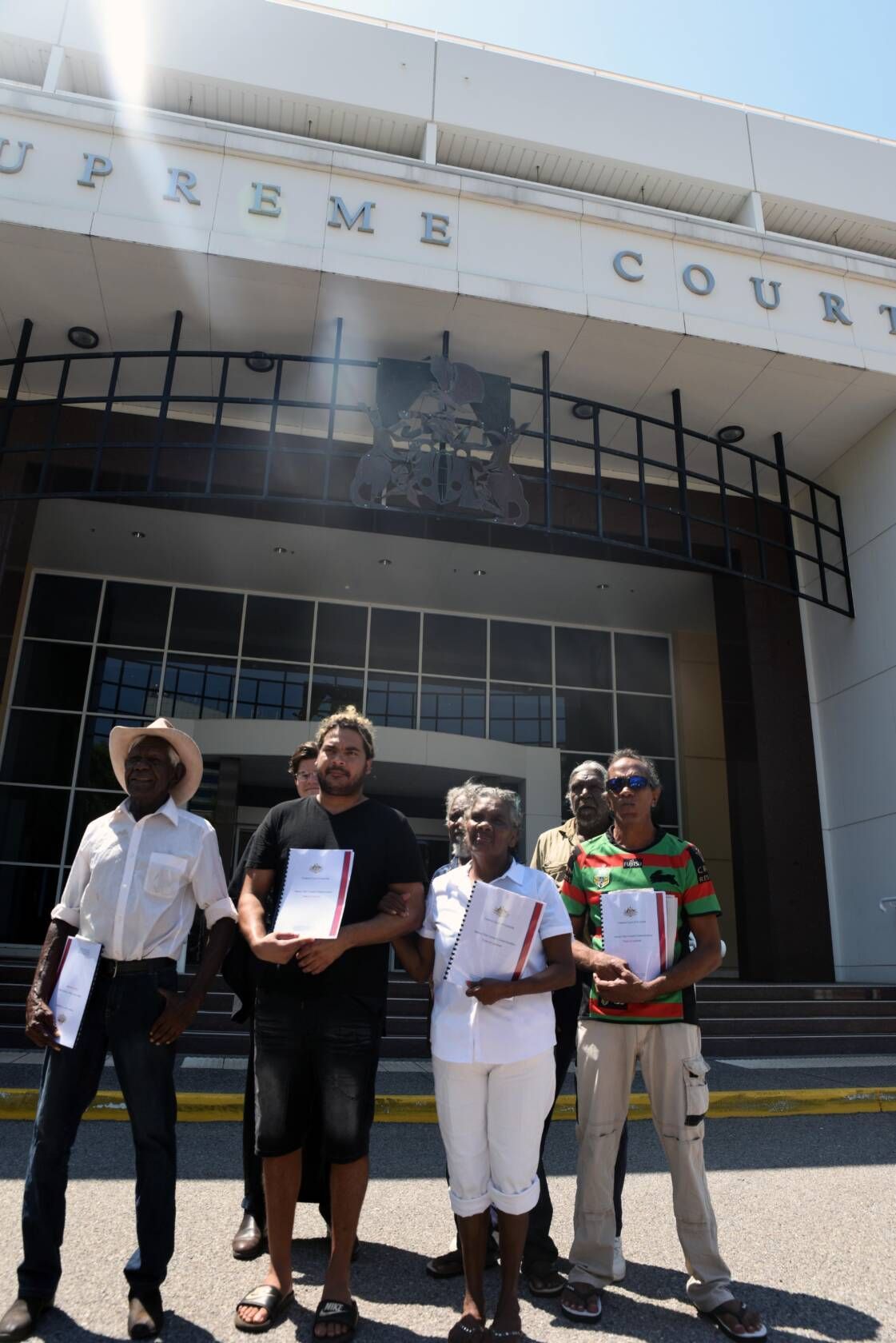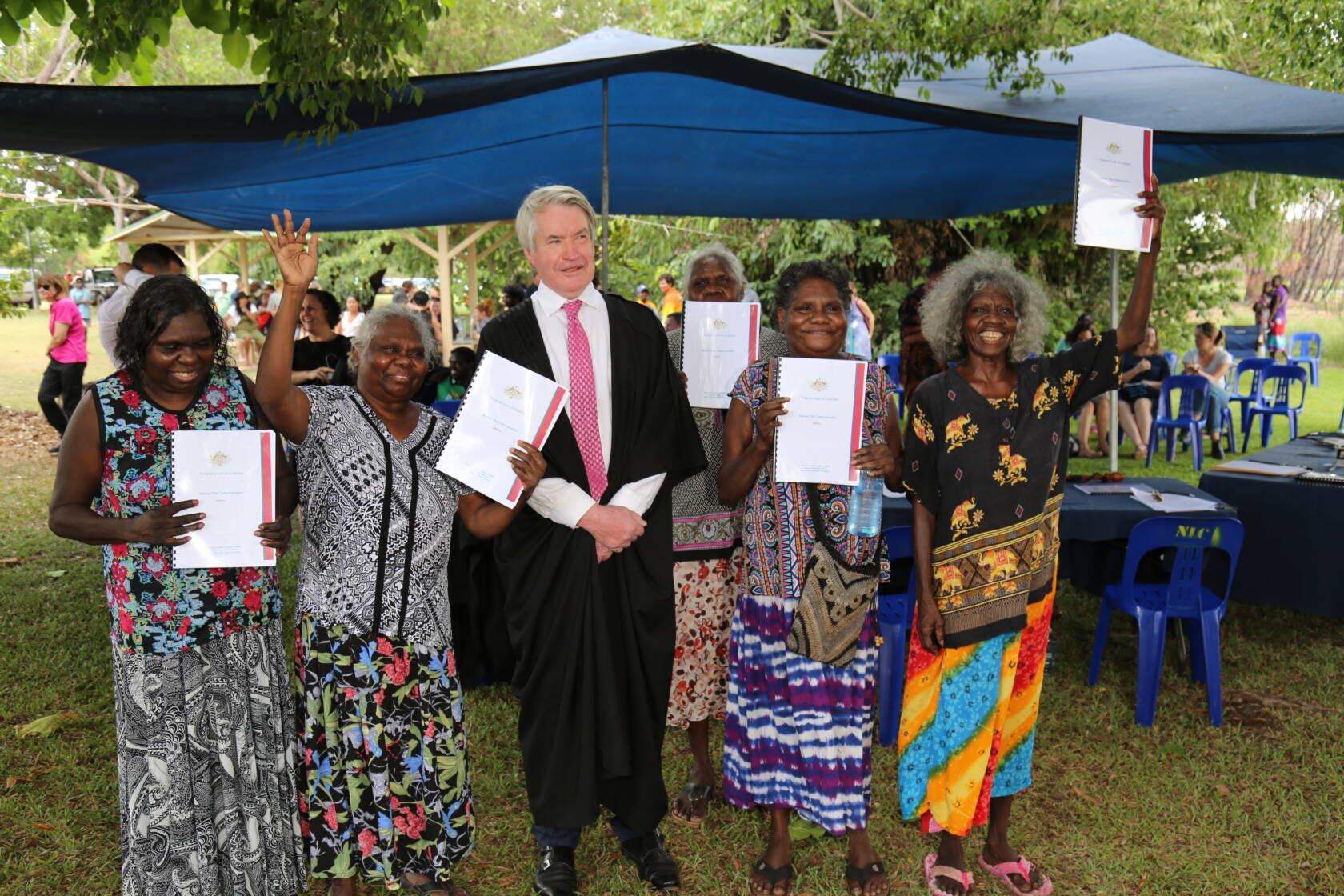History made as native title rights finally recognised
Two historic native title claims are now resolved, decades after they were first claimed.
Larrimah returned to Wubalawun group

The Federal Court of Australia held a special hearing at the Supreme Court of the NT in Darwin on 24 October 2018 to recognise native title rights and interests over the town of Larrimah.
It marked the last piece of the puzzle for members of the Wubalawun group who hold Native Title over surrounding pastoral leases.
The lead applicant on the claim, Jimmy Wavehill travelled to Darwin with members of his family, as well as the Maroney and Birdum families.
Alan Maroney spoke on behalf of his people outside the Supreme Court. When asked how he felt following this historic decision, he said: “Relief. [It’s been] a long struggle. [I’ve been] forever questioning myself whether it’s been worth it. After today, my heart’s been lifted to say yes it’s been bloody worth it.”
“I started this process back in 2001, the original claimant for Larrimah so it’s been 18 years for me.”
“I’m really glad that NLC has supported us for the long road that we had to take and I believe now that our next generation should be able to stand up and say yes this is our country, finally.”
Native title over parts of the town of Larrimah was first claimed in 2001 and extended in 2011 to include the whole town. At this time, Jimmy Wavehill became the lead claimant.
“I feel happy today, what we do,” said Jimmy. “We keep trying and trying till we got it now.”
“I’m real happy and I’m real proud with my grandkids. We help each other. We do our best. We got our country back. In my heart, I really love them very much.”
The Larrimah native title determination recognises a right to “access and take resources for any purpose” – including for commercial purposes, not limited to personal or domestic purposes.
This is the first time that right has been recognised in the Northern Territory by agreement of the Northern Territory Government and native title claimants without going to trial as occurred in the Town of Borroloola in 2016.
Former NLC CEO Joe Morrison described it as a historic day.
“It’s very significant because it’s the first time in the NT that, by agreement of the parties, that a right to trade has been recognised as part of the native title determination as we’ve seen previously in Borroloola that that was by trial.”
“It means that there’s recognition that there was basically an economy that Aboriginal people had had at the time of the settlers arriving. Obviously Aboriginal people know that there was a customary economy in place and that is recognising that in a modern context.”
It is hoped this determination will pave the way for recognition of that right in other parts of the Northern Territory without the need for costly trials.
What happens next is a question for the native title holders.
“They’ve moved from being claimants to holders of these rights as determined by the Federal Court today so it’s really a question for them in the Northern Territory to come together to think about what the future of Larrimah might look like. And I think today’s important because native title holders should in fact be at the table for negotiations of their future town,” said Mr Morrison.
Mr Maroney said the Wubalawun people had high hopes for the future of Larrimah.
“We’d like to change it so that it’s more of a family town so that everyone can enjoy Larrimah.”
“Now we’ve got bargaining powers in regards to getting funding and building houses for our younger generation. Now we have got the bargaining power in regards to talking to the NT government of assisting us build the township of Larrimah, which I believe can prosper.”
Mr Maroney would like to see an Indigenous Ranger program set up to encourage young people to move back to the town and work alongside native title holders in Middle Creek and Birdum.
“Now that Aboriginal people have now got title of Larrimah we can open up to places that have never been open before.”
21-year fight for Jabiru resolved

One of the longest running native title claims in Australia’s history was resolved in November when the Mirarr people were recognised as the native title holders of Jabiru at a special on-country hearing.
Lead claimant, senior Traditional Owner Yvonne Margarula, first lodged the claim with the National Native Title Tribunal in 1997 and it was filed with the Federal Court in 1998.
Ms Margarula said the Mirarr were happy to see the long journey finally come to an end. “We are Mirarr, we bring the land back now, that was a long time we’ve been waiting,” she said.
Five women who were central to the claim, Ms Margarula, Nida Mangarnbarr, Annie Ngalmirama, May Nango and Ruth Gamarrawu, were presented with hardcopies of the determination.
The Mirarr estate extends beyond Jabiru to include the areas currently affected by the Ranger uranium mine and the Jabiluka mineral lease.
Chairman of the NLC, Samuel Bush-Blanasi, said the claim is part of a bigger struggle by the Mirarr people, and reflects the finding of the 1977 Fox inquiry into uranium mining, which recognised the Mirrar as the Traditional Owners.
“Back then it was the government saying ‘we give you land rights you give as mining’. Today this native title proves the Mirarr are the Traditional Owners of Jabiru and assure that in Australian law,” he said.
Also speaking at the ceremony was Mirarr Traditional Owner Simon Mudjandi, who spoke of the Mirarr’s vision for the future of Jabiru.
“Lots of people know about Kakadu, they know it is important World Heritage country. We Mirarr people want to show them how special this country is and to make Jabiru a great town for locals too. We want Jabiru to be a place to show people.
The Northern Territory Government and the Gundjeihmi Aboriginal Corporation, which represents Mirarr, have a $500 million vision for the post-mining future of Jabiru, which includes its transformation into a tourism hub and regional centre to service the Bininj community.
“We want people to come and learn about our country and culture. We look forward to welcoming people to the new town of Jabiru on beautiful Mirarr country,” he said.
Essential to that plan is the successful rehabilitation of the mine site.
“We want to see the mining company do a really good job of cleaning it up, they need to make it good enough to be part of the World Heritage National Park.”
“This is a big job and the government needs to make sure the mining company does it properly.”
Indigenous Affairs Minister, Nigel Scullion said it brought him immense joy to see the historic final determination go the way of the land’s traditional owners.
“This is a hard-fought, deserved outcome for the Mirrar people,” Minister Scullion said. “They are the true owners of the lands in the north of the Northern Territory.
The application for native title over Jabiru Township and its immediate surrounds is around 13 square kilometres in size.
